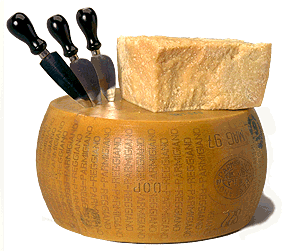Stefano Sandri
By its application in Case C 132/05, the Commission requested the Court of Justice to declare that, by formally refusing to proceed against the use, on its territory, of the name ‘Parmesan’ on the labelling of products which do not comply with
 the requirements of the specification for the protected designation of origin (PDO) ‘Parmigiano Reggiano’, thereby favouring the appropriation of the reputation of the genuine, Community-wide protected product, the Federal Republic of Germany has failed to fulfil its obligations under Article 13(1)(b) of Council Regulation (EEC) No 2081/92 of 14 July 1992 on the protection of geographical indications and designations of origin for agricultural products and foodstuffs.
the requirements of the specification for the protected designation of origin (PDO) ‘Parmigiano Reggiano’, thereby favouring the appropriation of the reputation of the genuine, Community-wide protected product, the Federal Republic of Germany has failed to fulfil its obligations under Article 13(1)(b) of Council Regulation (EEC) No 2081/92 of 14 July 1992 on the protection of geographical indications and designations of origin for agricultural products and foodstuffs.
The Federal Republic of Germany denied the failure to fulfil obligations on three grounds:
– first, a designation of origin is protected under Article 13 of Regulation No 2081/92 only in the exact form in which it is registered;
– second, the use of the word ‘Parmesan’ does not infringe the protection of the designation of origin ‘Parmigiano Reggiano’, and
– third, it is not bound to proceed on its own motion against infringements of Article 13 of the Regulation.
The action brought by the Commission has been dismissed by the Court ‘ judgement delivered on 26 February 2008. The Federal Republic of Germany’s argument that a PDO enjoys protection under Article 13 of Regulation No 2081/92 only in the exact form in which it is registered did not succeed. The system of Community protection is underpinned by the principle that the registration of a designation containing several terms confers the protection of Community law both on the constituent elements of the compound designation and on the designation as a whole. The effective protection of compound designations therefore implies that, in principle, all the constituent elements of a compound designation are protected against abuse.
Pursuant to the judgment the use of the name ‘Parmesan’ must be regarded, in the sense of Article 13(1)(b) of Regulation No 2081/92, as an evocation of the PDO ‘Parmigiano Reggiano’. Accordingly the question whether the name ‘Parmesan’ is a translation of the PDO ‘Parmigiano Reggiano’ is of no relevance for the assessment of the action. The Federal Republic of Germany nevertheless has submitted that, since the name ‘Parmesan’ has become a generic name, its use cannot amount to an unlawful evocation of the PDO ‘Parmigiano Reggiano’. However it was for the Federal Republic of Germany to prove that argument to be well founded, all the more so because the Court has already held that it is far from clear that the designation ‘Parmesan’ has become generic. Since the Federal Republic of Germany has failed to show that the name ‘Parmesan’ has become generic, use of the word ‘Parmesan’ for cheese which does not comply with the specification for the PDO ‘Parmigiano Reggiano’ must be regarded for the purposes of the proceedings as infringing the protection provided for that PDO under Article 13(1)(b) of Regulation No 2081/92.
that it is far from clear that the designation ‘Parmesan’ has become generic. Since the Federal Republic of Germany has failed to show that the name ‘Parmesan’ has become generic, use of the word ‘Parmesan’ for cheese which does not comply with the specification for the PDO ‘Parmigiano Reggiano’ must be regarded for the purposes of the proceedings as infringing the protection provided for that PDO under Article 13(1)(b) of Regulation No 2081/92.
 that it is far from clear that the designation ‘Parmesan’ has become generic. Since the Federal Republic of Germany has failed to show that the name ‘Parmesan’ has become generic, use of the word ‘Parmesan’ for cheese which does not comply with the specification for the PDO ‘Parmigiano Reggiano’ must be regarded for the purposes of the proceedings as infringing the protection provided for that PDO under Article 13(1)(b) of Regulation No 2081/92.
that it is far from clear that the designation ‘Parmesan’ has become generic. Since the Federal Republic of Germany has failed to show that the name ‘Parmesan’ has become generic, use of the word ‘Parmesan’ for cheese which does not comply with the specification for the PDO ‘Parmigiano Reggiano’ must be regarded for the purposes of the proceedings as infringing the protection provided for that PDO under Article 13(1)(b) of Regulation No 2081/92. Finally, Commission has not demonstrated that the Federal Republic of Germany has failed to comply with the obligations under Regulation No 2081/92, namely by formally refusing to proceed against the use on its territory of the name ‘Parmesan’ on the labelling of products which do not comply with the requirements of the specification for the PDO ‘Parmigiano Reggiano’. Commission has not furnished proof that National measures were not taken or were not such as to protect the PDO ‘Parmigiano Reggiano’.
To avoid any misunderstanding is has to be noted that the issue as to whether the term ‘Parmigiano Reggiano’ has become generic or not was here not in question.






Nessun commento:
Posta un commento